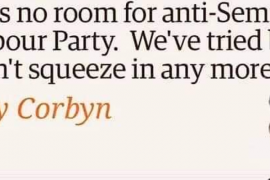A guest post by AKUS
Like people waking up with a hangover, much of the world is beginning to wonder what exactly happened in Egypt this month.
The Guardian was so enthralled by the events that it started publishing articles simultaneously in Arabic, pandering, apparently, to what it must believe is a Bolshevik style group of revolutionaries taking over the country to create a workers’ paradise to Egypt. The Guardian chooses to brush aside any unpleasantness (“whatever follows …”) and continues true to form in an editorial, Egypt: brave new Arab world:
“Whatever follows, this is a moment of historic significance. It re-establishes Egypt as the leader of the Arab world and Egyptians at its moral core. This revolution – the only word that fits – was carried out by ordinary people demanding, with extraordinary tenacity, basic political rights: free elections, real political parties, a police force that upholds rather than undermines the rule of law. Try as some may to paint them as the lackeys of Islamism, they did this on their own and, to a large extent, peacefully. This was a fight in which Muslims and Christians stood side by side. No sectarian flags were visible in Tahrir Square, just the national one.”
The editor who wrote that glibly headed column should re-read “Brave New World” before wishing a similar future upon the Arabs. The Guardian editor may have been pleased to see no sectarian flags, but was not disturbed by the rabidly anti-Semitic and anti-Israeli posters on display. Egyptian media had no trouble, pro or anti-Mubarak, blaming Israel for either the demonstrations or the continuing existence of the Mubarak regime.
An article by Yehudit Barsky, “Anti-Semitism in Tahrir Square” provides examples showing Mubarak with a Magen David painted on his forehead, including pre-printed versions – clearly a popular theme:
Democracy in Egypt in some form yet to be determined may be a by-product of the upheaval in Egypt. However, despite the emphasis on democracy, something quite different has happened.
Since it is impossible to simply sweep every person associated with the Mubarak regime out of office if buses are to run, electricity to be provided, food to be distributed and so on, to a large extent the existing power structure has to be preserved at least temporarily. Even people like ElBaradei hungering for power understand that. Democracy is fine, but food is even more important and jobs, food and security, not democracy were key concerns of the majority of protesters.
There were only two forces in Egypt potentially capable of taking over control of the civil apparatus needed to run the country – the Muslim Brotherhood and the military. Since the military have the weapons, and the Muslim Brotherhood seems to be playing a waiting game (perhaps realizing that this is a job beyond its immediate capabilities) it should have been clear that the military would come out on top. Of course, that is what has happened. Quite simply, even perhaps by accident, there has been a velvet military coup in Egypt.
In the Washington Post, which is also still swept up in the euphoria, reality is creeping in. An article entitled Elated protesters ‘staying put’ in Tahrir Square until demands for democracy are met includes a clue as to what may yet happen:
“Egypt’s military chiefs, who took control of the country after Mubarak’s abrupt abdication Friday, said in a statement Saturday afternoon that Egypt would abide by all its international agreements, including Israel, and that they had asked the current government to stay in place until a new one is formed. The statement also said that the military is committed to eventually handing over power to an elected administration”.
The Egyptians planning to stay put in Tahrir Square may find that there is nothing more permanent than a group planning to “eventually hand[ing] over power”. The most optimistic outcome I can envisage, which is not the worst one, is the Turkish model where the army plays a key role behind the scenes preventing Islamist parties taking over the country. The military’s immediate declaration that it would maintain the peace with Israel is also a positive sign. The generals apparently like their toys but do not wish to risk deploying them against Israel. The joyful noises coming from Gaza will quickly turn out to be premature.
The generals have retained control of Egypt without even the proverbial whiff of grapeshot being needed. An iron fist has achieved a velvet coup.
As for the Guardian and its “Brave New World”:
“And if ever, by some unlucky chance, anything unpleasant should somehow happen, why, there’s always soma to give you a holiday from the facts. And there’s always soma to calm your anger, to reconcile you to your enemies, to make you patient and long-suffering. In the past you could only accomplish these things by making a great effort and after years of hard moral training. Now, you swallow two or three half-gramme tablets, and there you are. Anybody can be virtuous now. You can carry at least half your morality about in a bottle. Christianity without tears—that’s what soma is” – Aldous Huxley, Brave new World.
There’s always the Guardian to give you a holiday from reality. You read two or three half-baked columns in the Guardian, and there you are. You can carry at least half your morality on a Smartphone. Revolution without tears – that is what the Guardian is.







